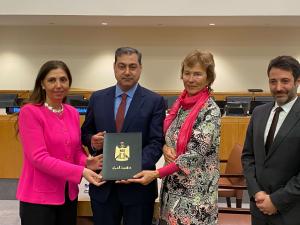Iraq has become the first country in the Middle East to join the UN Water Convention. The agreement aims to ensure sustainable use of transboundary water resources across international borders. Nineteen of the 22 Arab countries are considered water scarce, and Iraq is experiencing mounting social, economic, and political pressures due to water scarcity.
Low rainfall, increasing temperatures, and reductions in the country’s surface water have led to critically low levels of water in Iraq in recent years. Iraq’s President, Abdul Latif Rashid, warned of the impact of climate-related factors such as drought, dust storms, and high temperatures. He encouraged neighbouring countries to join both the 1997 United Nations Convention on the Law of Non-Navigational Uses of International Watercourses and the 1992 Convention on the Protection and Use of Transboundary Watercourses and International Lakes.
The Tigris and Euphrates rivers are the most important sources of surface water for some 237 million people across Iraq, Iran, Syria, and Turkey. The UN Water Convention requires signatory countries to use transboundary waters reasonably and equitably and ensure their sustainable management.
Why is it significant that Iraq has joined the UN Water Convention?
Iraq’s move to join the UN Water Convention is seen as a significant step towards promoting sustainable use of transboundary water resources and ensuring cooperation among riparian countries in the region. As one of the countries hardest hit by climate change, Iraq is facing a real water crisis, with its surface water sources, such as the Euphrates and Tigris Rivers, facing critical levels of depletion.
The UN Water Convention aims to ensure the reasonable and equitable use of transboundary waters and to promote sustainable management practices. With Iraq now a signatory to this convention, it will have access to a framework that promotes regional cooperation and facilitates peaceful resolution of water-related disputes.
Iraq’s decision to join the UN Water Convention is also expected to have positive impacts on the country’s sustainable development goals. As water scarcity continues to be a major challenge in Iraq, sustainable management practices will be critical to ensuring access to clean water and improving the health and well-being of its citizens. Additionally, transboundary cooperation can contribute to regional stability and peace, which are vital for Iraq’s long-term prosperity.
The UN Water Convention is a legally binding agreement that is open to signature by all United Nations Member States, as well as regional economic integration organizations. As of 2023, a total of 49 countries and the European Union have become parties to the convention. The Convention provides a framework for the development of principles, norms, and guidelines for cooperation on the use of transboundary water resources, as well as mechanisms for monitoring and reporting on compliance with its provisions.
Iraq’s accession to the UN Water Convention marks a significant milestone in the country’s efforts to promote sustainable management of its transboundary water resources. It sends a clear message to other countries in the region that cooperation and collaboration are essential to ensuring access to clean water and promoting sustainable development. As the international community continues to grapple with the impacts of climate change, cooperation on transboundary water resources will be critical to ensuring a sustainable and peaceful future for all.
Image Credit: unece



















